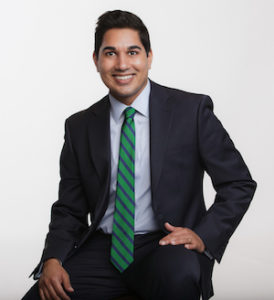Q&A: Mediator & Arbitrator Parag Shah
Mon, Apr 15th, 2019 | by Miles Mediation and Arbitration | Get to Know our Neutrals | Social Share
 What do you say in the opening session to orient the parties to the mediation process and get things off to a good start?
What do you say in the opening session to orient the parties to the mediation process and get things off to a good start?
I always start with a smile. Everyone is a little nervous, unsure and guarded when they come to a mediation. A smile helps to create an atmosphere of openness. Every mediation is its own unique experience and one size does not fit all. I try to start by meeting all the people individually and gauging what their expectations and worries are of the process. Based on the information they provide me, I tailor my opening session specific to their expectations and concerns. My goal in the opening is to get everyone to see this not as a court proceeding, but as a problem-solving brainstorming session where we are all working together to come to a resolution that is beneficial for everyone.
There’s a prevailing notion that one needs decades of experience to be a mediator or arbitrator, but the success of your ADR practice, runs counter to this notion. Why is this the case?
Experience is always helpful but alone it makes neutrals lazy because they use that experience as a crutch. To effectively solve disputes, you must have resolution skills. And like any sport, skills can always be sharpened. The legal world is constantly evolving with the world becoming smaller and technology rapidly growing. What may have been the case 5 or 10 years ago, may not be the case anymore. Neutrals need to be current and on the forefront of changes that are happening in order to effectively solve disputes. To do that, you need people who don’t rest on experience but are motivated to constantly grow and develop their skills.
It’s often said that a good mediator needs to have credibility. What makes you a credible mediator?
Not telling people what to do, but listening. I try to remember that my job is to help with solving the dispute, not telling the parties how to solve it. When you have built that credibility with the parties, they will invite you to join them in the discussion of how to best solve the problem. Until then, the best way to build credibility is through active listening, empathy, and asking questions.
Trauma impacts how people function, communicate, collaborate and negotiate with others. It’s crucial that mediators recognize the experiences and emotions that clients display at mediation. Sometimes the client’s needs can impact the process and outcome at mediation. How do you manage these types of mediations?
Through empathy versus sympathy. Sympathy is when you share the feelings of another; Empathy is when you understand the feelings of another but do not necessarily share them. Having the background and experiences that I have gives me a certain perspective that allows me to connect with people of all walks of life. Tapping into the emotional center of people is one of my strongest qualities as a neutral and has made the difference in these types of mediations.
For those who believe alternative dispute resolution will delay a trial and increase costs. How would you respond to this view?
Focus groups are invaluable to litigants. Mediation is essentially a focus group of one where someone with subject matter expertise is able to provide a focused analysis of the case and provide valuable information from the other side on aspects of the case that may have been overlooked or underappreciated. No other time in the litigation can this happen. A fresh perspective is always beneficial to trial and never a waste of money.
VIEW PARAG’S BIO & ONLINE CALENDAR

